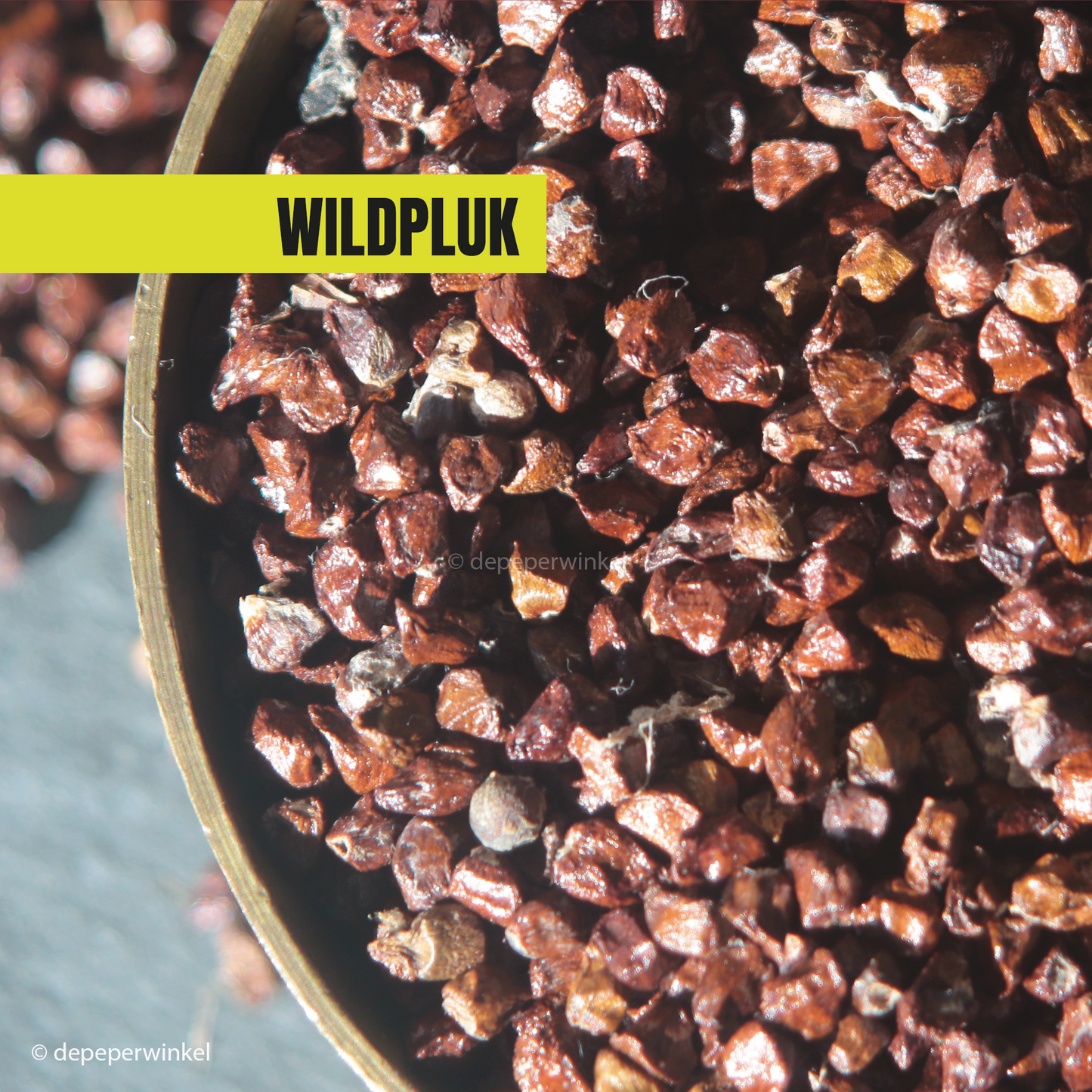depeperwinkel
<tc>Grains of paradise</tc>
<tc>Grains of paradise</tc>
Unable to load availability for pickup
Grain of paradise is a spicy pepper, popular in West African and Surinamese cuisine. The small seeds are contained in a seed pod, embedded in a jelly-like fluid, which hardens after drying.
We supply grain of paradise as a seed pod - for peeling yourself - and in peeled form, the so-called grains (seeds).
This (pseudo)pepper from Cameroon (sometimes we get our grain of paradise from Ghana) is a member of the ginger family (Zingiberaceae), and is also known by names such as Guinea pepper and malaguetta pepper. It has been an important spice in West African and Surinamese cuisine for centuries.
The plant, like all ginger-like plants, grows in a warm, moist environment and likes some shade. The rhizome (rhizome) grows just underground. The plant grows to about 2 meters high and has elongated and pointed leaves, like bamboo. Trumpet-like flowers form close to the ground, which appear to emerge directly from the ground, but are on stalks. They are 15 cm long and light purple and soon fall off to make way for large reddish-brown 'pods' (10 cm). These contain red-brown seeds in a jelly-like liquid, the grain of paradise.
It takes three years for sown plants to produce a usable harvest. From then on, harvesting can be done for four years in a row. The pods are picked when they are ripe. A modest portion is sold fresh in West Africa, the lion's share is left to dry in the sun.
Unique. It is not always possible to obtain this, but the paradise grain that we currently supply is not grown but comes from wild picking!
Grain of paradise tastes stronger and is sharper than regular pepper due to the ketone paradol, an antioxidant that is found exclusively in these peppers, and in ginger.
The grain of paradise is closely related to other African pepper plants, the Aframomum danielli, whose seeds are called mbongo or alligator pepper, and the very rare Aframomum angustifolium, the Madagascar cardamom. Grain of paradise is hardly sold unpeeled, as a rule only the loose seeds are available, also from us.
Smell and taste
Grain of paradise is a spice that smells of forest and wet wood. It tastes sharp at first, later pleasant citrus notes and notes of cinnamon, cloves and cardamom (a distant relative) emerge. The aftertaste is pleasant. Some of the taste and smell determining essential oils in grain of paradise are:
- [6]-paradol, the dominant pungent substance, is also found in ginger,
- [6]-gingerol, better known as the sharpness of ginger, when dried becomes [6]-shoagol, twice as sharp as gingerol
- β-caryophyllene, sweet spicy and woody
- linalyl acetate, responsible for a pleasant citrus, bergamot and lavender scent,
- sabinene, responsible for the woody, camphoraceous flavor of black pepper and nutmeg, among others
- β-myrcene, spicy aroma, with notes of fruits (mango, grape, peach) and mint,
- α-caryophyllene (humulene), hops, as in beer and cannabis
- d-limonene, responsible for the citrus aromas,
To reach the kernels, remove the skirt of the seed pod and flatten the core of the fruit. This must be done carefully, because it is important to keep the seeds as whole as possible, in order to be able to separate them from the other contents of the capsule.
The grains are ground just like peppercorns.A good ras el hanout contains grain of paradise, which is called 'gouza sahraouia' in Morocco. In many versions of ras-el-hanout it is now replaced by Asian cubeb pepper, or black pepper. Grain of paradise is on the rise again, not only in African cuisines, but also in beers, spirits and European cuisine.
Grain of paradise is delicious with lamb dishes, zucchini, potatoes and eggplant.
Features:
- 100% fruits of the Aframomum meleguetta (unpeeled)
- origin: Cameroon
Assortment
- available in glass, stand-up pouch and test tube
- glass jar contains 75 grams
- stand-up pouches with a capacity of up to 30 to 500 grams
- available in 10 ml test tube
- larger quantities on request
Gift packaging
- the jar is available in a tasteful gift packaging, consisting of a cube box filled with black tissue paper
- for an overview of our gift packaging, please refer to the gift packaging section
General advice
- grind the pepper at the last minute to maximize the aroma
- store the pepper in a dark, dry and cool place
Save:
- store your grain of paradise in closed packaging
- preferably store in a dark, dry and cool place
- best before May 2025 (05/25)
- this expiration date is an indication
Would you like to know what grain of paradise tastes like?
Share









